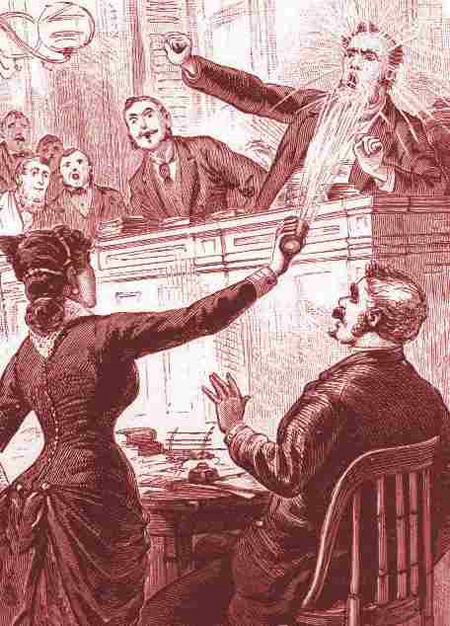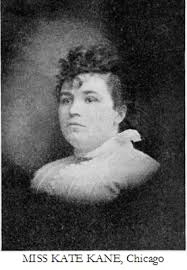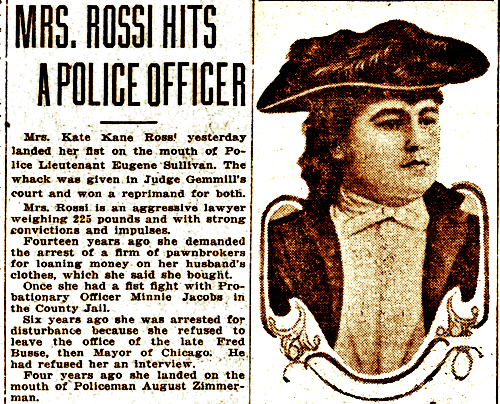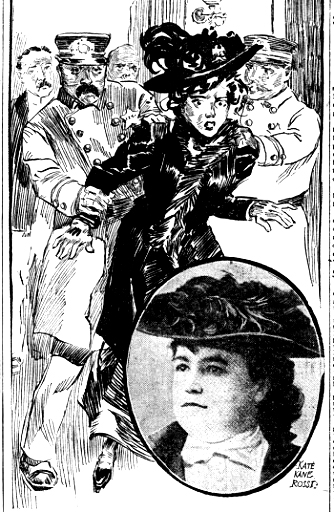“Take that you dirty dog!”
One of the more controversial characters in Lavinia Goodell’s diaries is Kate Kane (Rossi), Wisconsin’s second woman lawyer. Lavinia helped launch her career. If she had lived long enough to watch it unfold, she probably wouldn’t want the credit. Lavinia was brilliant but cool and reserved in public – more RBG than AOC. And Kate? She was smart but also a hothead and a showboat, who gave other early women lawyers a bad rap.

Lavinia’s diary first mentioned Kate on August 13, 1875: “Worked on brief. Had call from Miss Kane, a young woman who wanted advice about studying law.” Lavinia (36) and Kate (21) soon became friends.
Kate often stopped by Lavinia’s office and the Goodells’ home. They attended temperance meetings, book club, court, and jail together. In 1877, Lavinia invited her to the Goodell family’s Thanksgiving and even gave her a necktie and perfume for Christmas.
Kate attended one year of law school at the University of Michigan. Then like Lavinia, she apprenticed at A.A. Jackson’s law firm. Lavinia occasionally hired her to help with her cases.
The Rock County Circuit Court admitted Kate in the summer of 1878, and the Milwaukee County Circuit Court followed suit a few months later. Reporting on the event, the Woman’s Journal wrote that Kane was a “fine-looking woman of unimpeachable moral character and indomitable will,” who went into court and “modestly took a back seat” until she was invited inside the bar.

The Milwaukee paper described her as a “pretty,” unmarried, “lady lawyer,” who just might end the difficulty of finding jurors because the court will have to “drive them off with clubs.” Associating Kate Kane with clubs in court proved prescient.
In the winter of 1879 Lavinia formed Wisconsin’s first female law firm with Angie King, Wisconsin’s third woman lawyer. That’s about when Kate set up practice in Milwaukee, so maybe she wasn’t invited. Here’s what Lavinia told her cousin:
Miss Kane is still drifting along in a vagabond way. She don’t seem to know how to plan for the future. If she only suited me I would open an office and take her in partnership and give her a start, but she will do so many things that I don’t like.
Lavinia objected to Kate joking and sneering about temperance and religion, and she was alarmed about her lack of judgment. Her letter continued:
I left thoroughly disgusted and heartsick and thought to myself is it for such as these that I went through the agony of breaking my way into a new profession of women? I don’t know but Miss K. means well enough but she certainly lacks judgment, principle, and refinement. I am getting to like her less and less, and I am sorry for it, for she has some desirable qualities. Angie has a good deal more sense, and I hope she will do well.
Although Kate was living in Milwaukee, she still helped with Ingalls v. State, the case that led to Lavinia’s great triumph – admission to the Wisconsin Supreme Court. Lavinia toiled years for that privilege, but the big event proved a letdown. Her June 18, 1879 diary entry reads:
Went to Sup. Ct. Got admitted, but poor Miss Kane left out, which spoiled all my pleasure. Tired from not sleeping night before.
It’s not clear whether Kate simultaneously moved for admission but was “left out” or something else happened. What is clear is that Kate soon began making a quite a name for herself.
If Lavinia’s 1875 run for Janesville City Attorney (winning 60 votes) seemed daring, Kate’s 1883 run for the Wisconsin Supreme Court (winning 3 votes) was audacious.
Shortly after her defeat, Kate told Milwaukee Judge James Mallory “take that you dirty dog!” and threw a glass of water in his face. He had reassigned one of her clients to a lawyer who had worked on his re-election campaign. Kate said he was trying to drive her out, so she wanted to insult him just where he had insulted her—in the courtroom. He ordered her arrest and had her hauled to jail where she stewed for several weeks before paying a small fine to be released. The case made national headlines.
It also ended Kate’s legal career in Milwaukee. Down in Chicago she became a respected lawyer, litigated high profile cases, but persisted in outbursts. She accused one judge of colluding with a state’s attorney against her client. The judge fined her $10.
She slapped an attorney in open court and was arrested.

She punched a police officer in the mouth during court and was reprimanded.
By middle age, Kate weighed 225 pounds. When her neighbor called her “jumbo,” she seized the woman and started pounding her with a broom handle. Kate was charged with assault.

She ran for state’s attorney calling for “the abolition of female slavery.” Votes unknown.
When Chicago’s African American Assistant City Attorney refused to prosecute a company on a noise complaint, Kate called him “a black vagabond” whose “place is somewhere down south with a rope around your neck.” He told her she “should be nursing somebody’s kids.” She replied by breaking her parasol over his head.
That’s just a taste of Kate’s antics. None of them would have sat well with Lavinia Goodell. And yet Kate figured prominently in Lavinia’s dying days and will contest. More on that in a future post! CB
Sources consulted: Chicago Tribune, October 28, 1896, p. 3; Joel E. Black, Citizen Kane: The Everyday Ordeals and Self-Fashioned Citizenship of Wisconsin’s “Lady Lawyer,” 33 Am. Law & Hist. Rev. 201 (Feb. 2015)(quoting local papers that are quoted in this post); Kate Kane and the Red Mist of History, https:/womensagenda.com.au/; Kate Kane, Chicago Lawyer, and Her Fists of Fury, http://mysteriouschicago.com/kate-kane-chicago-lawyer-and-her-fists-of-fury/; A Woman Lawyer in Milwaukee, Woman’s Journal, 3/22/1879; Lavinia Goodell’s Diaries, 8/13/1875, 8/22/1877, 10/22-23/1877, 11/23//1877, 1/4/78, 6/18/79, Lavinia Goodell’s letter to Sarah Thomas dated 1/17/79.







